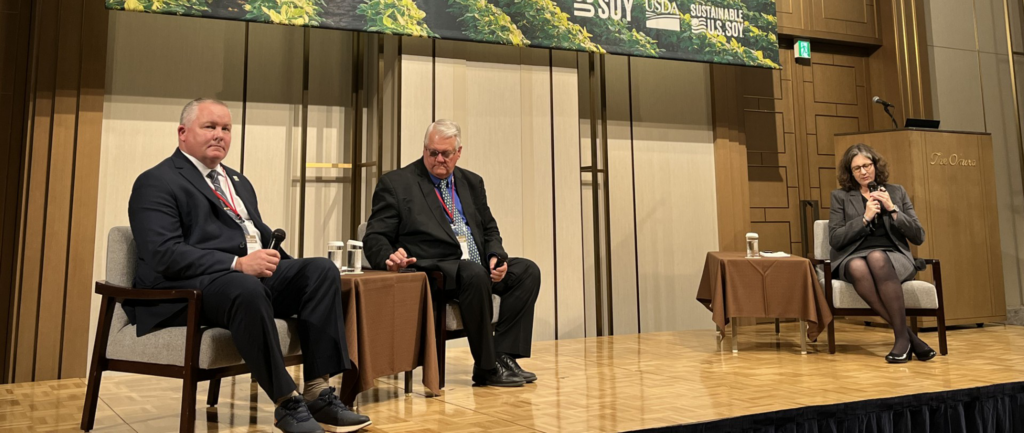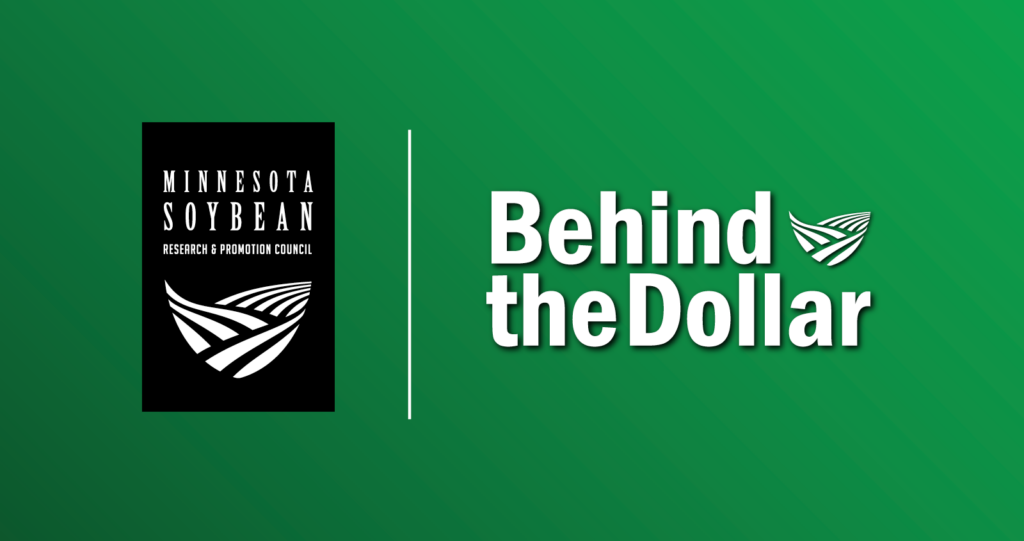A checkoff-centric Q&A with Minnesota Soybean Research & Promotion Council (MSR&PC) Director Ben Storm.
Read below to find out his thoughts on the Council’s Behind the Dollar initiative.
This interview has been edited for length and clarity.
Q: Give us a quick background on your farm.
Ben Storm: We farm in southeastern Minnesota, in Olmsted County. We raise corn and soybeans, oats and pigs.
Q: What region of the state do you represent on the Minnesota Soybean Research & Promotion Council? How long have you been on the board?
BS: I represent District 9 for the Council. I will be beginning my third term this year and I was just reelected for another term. I’ve been on the board for six years and will be starting on my seventh.
Q: Why did you decide to run for the Minnesota Soybean Research & Promotion Council?
BS: I’ve been on my county board for a lot of years, and I was asked if I wanted to run. It was a good opportunity to continue my involvement.
Q: Why do you feel the checkoff is critical to Minnesota’s soybean farmers?
BS: This is a topic up for a lot of debate lately on the internet. I believe that there is a lot of research and promotion. I didn’t realize to the extent or what is done with the soybean checkoff dollars until I was on the Council myself. There is a lot that we’re doing that farmers don’t realize – like the worldwide reach that we have just as Minnesota soybean farmers with our checkoff money and the amount of research projects and promotion projects.
The checkoff definitely adds to our bottom line every year. After being on the Council for six years, I am more confident in the use of my checkoff dollars than I’ve ever been.
Q: How does the board ensure checkoff dollars are invested responsibly?
BS: Everything is voted on as a group. It’s a board decision and while most decisions since I’ve been on the board have been unanimous, a lot of decisions are debated on and go back and forth a lot.
Q: How has directing checkoff funds raised your awareness of the soy checkoff?
BS: The biggest eye-opening thing for me, personally, was the amount of worldwide reach we have just as a Minnesota checkoff board alone. Our work in Uzbekistan is a prime example of things that we can do with our checkoff money just as Minnesota farmers.
Q: What project(s) are you most proud of that you have seen since being on the board?
BS: The biggest one, as of now, is Uzbekistan. That was an eye-opening experience in and of itself, just the way the people there treated us and what we saw of the agricultural industry. It was very interesting.
Q: Many checkoff investments are made to impact our future growers. What are some checkoff-supported projects coming down the pipeline that you’re excited about?
BS: I’m excited to continue our work in Uzbekistan. I think this could really be a big market in the future for both soybeans and soybean meal. I’m also excited to get the Ag Innovation Campus up and running. That will help in our work to get projects from the idea phase into production by researchers having the ability to crush beans on a small scale.
Q: What do you think the biggest misconception other farmers have about the soy checkoff program? How would you respond to their concerns?
BS: There was a post online just the other day that I was reading and there’s a lot of people that are convinced that all the money does is get spent on steak dinners and trips. We don’t go on trips just to go on trips; its important trade missions like us going to Uzbekistan where we’re actually accomplishing a mission.
Our recent visit there helped secure another sale and shipment of U.S. soybean meal.
Q: Where can another farmer go to get more information on how their dollars are being spent?
BS: If you’re a soybean farmer in Minnesota, you have a local voice in your district, and all that information is right on the Council’s website. If you have questions or comments, want to see different stuff, or you have a pet project in mind, let the Council know. If you feel really passionate about it, run for the Council. We’re always looking for new people.






